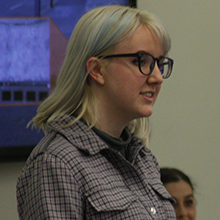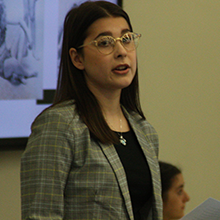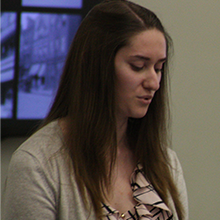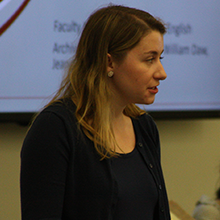ASRA Past Recipients

Children’s Voices in the 19th Century and What it Revealed about Adult Constructions of Childhood
Stephanie Liang
About the project: My project examines child voices in juvenile periodicals of the 19th Century, including St. Nicholas Magazine and Robert Merry’s Museum, in order to learn what these voices reveal about the adult construction of childhood. In my research, I have uncovered the ways in which adults impose their authority in these spheres created for and populated by children, such as the St. Nicholas League and the Letterbox columns. Through content restrictions, word limits, and required adult-endorsements of child-authored work, adults follow a very narrow idea of the child to exist within their pages, one that fits with their notions of what a child should look and sound like. The practice of allowing a child to speak but then regulating that voice and selecting only voices that exemplify a fictionalized, “ideal” version of a child helped perpetuate adult authority and the myth of childhood, which exists even in the present day.
Year: 2016
Faculty Mentor: Courtney Weikle-Mills
Faculty Department: English
Librarian / Archivist: Clare Withers
Deliverables: Tumblr Post

David Hull Through His Own Philosophical Lens
Naomi Kasturiarachi
About the project: This project investigates the ways that philosopher David Hull (1935-2010) put his own philosophical approach into practice. Hull famously argued for an evolutionary theory of scientific change, according to which, conceptual and social change in science – like natural selection – requires heritability, variation, and differential fitness. I use this as an interpretive framework to highlight Hull’s own contributions to science and philosophy as demonstrated in the contents of his archival papers.
Year: 2016
Faculty Mentor: Andrew Inkpen
Faculty Department:
Librarian / Archivist: Lance Lugar, Brigitta Arden
Deliverables: Poster, Tumblr Post

A Case Study of 15th Century Gregorian Chant Leaves
Nicholas Grieneisen
About the project: University of Pittsburgh’s Hillman Library Special Collections Department holds 29 Gregorian chant leaves ranging from the 12th to 17th centuries from multiple locations in Western Europe. One set of six leaves, dating from the 15th century Netherlands, Is particularly interesting in that many of the originally scribed neumes, and occasionally the corresponding text, were erased and replaced with newly scribed neumes and text. My goals for this project were: 1) to analyize the musical differences between the pre-edited and post-edited chants, and 2) to research the socio-cultural atmosphere of the Catholic Church in 15th century Netherlands to determine what compelled the scribe to make these edits. In order to accomplish these tasks, I transcribed each of the pre-edited and post-edited versions of the chants using Sibelius notation software and subsequently analyzed the chants musically, as well as consulted multiple digital and print sources on subjects ranging from general church practices during the 15th century to specific performance practices in Netherlands. This project is meant to serve as a case study that will augment the growing knowledge base of Gregorian chant.
Year: 2016
Faculty Mentor: James Cassaro
Faculty Department: University Library System
Librarian / Archivist: James Cassaro
Deliverables:

The Possibility of Socialist Feminism: Here and There, 1970s – 1990s
Alexandria Greenhold
About the project: Socialist movements traditionally focus on means of production and distribution of wealth. The accomplishment of these tasks, however, relies on the deconstruction of hierarchical relationships, the abolition of the class system, and acknowledgement of the value of paid and unpaid labor by all members of society. Therefore, socialism and feminism can go hand in hand in many ways, as feminists seek to dismantle hierarchies of class, race, gender, and sexuality in order to create an equal and just society. In this study, I conducted a rhetorical analysis of literature (meeting minutes, newsletters, pamphlets, fliers, and booklets) written by various local and national socialist and feminist organizations in order to critique their strategies for political reform and disruption. For a comparative analysis, I looked at Sweden – another capitalist country with a notably different political system – to see how women and feminists played a part in the Social Democratic Party and to analyze the success of their welfare reforms. Through this research, one can understand how the past influences the present and hopefully, how the future can progress in the right direction.
Year: 2016
Faculty Mentor: Marie Skoczylas
Faculty Department:
Librarian / Archivist: Edward Galloway, David Grinnell
Deliverables:

The Depiction of Black Characters in Children’s Literature During Black Arts (1965-1975): A Movement to Education Children on the New Found Importance of Blacks
Corina Andriescu
About the project: The number of educated black youths has vastly grown since the end of slavery. With this increase in education comes an increase in the black child’s exposure to literature. As black children read in the early twentieth century, they found few books that depicted characters in a positive light. When the Black Arts movement grew during the Civil Rights era, which is only a cross section of history that differs in significant ways from what has come before and after, many authors sought to write and illustrate more books that were depictive of the rising black minority population. Some of these books were targeted specifically at children in hopes that the children will start learning about the importance of the black race early. These children’s book authors focused on three main points, which mirrored those that were being preached to adults during Civil Rights, and most importantly, the depiction of black people succeeding in society by dreaming, working hard, not being discouraged, and caring for one another. The children reading these works would not only be educated but also be instilled with a yearning to aim for a brighter future for themselves and for the black race.
Year: 2016
Faculty Mentor: Courtney Weikle-Mills
Faculty Department: English
Librarian / Archivist: Clare Withers
Deliverables: Tumblr Post, Contributed LibGuide content

Affective Experience of Queer Nostalgia in the Archives
Zachary Grewe
About the project: The number of educated black youths has vastly grown since the end of slavery. With this increase in education comes an increase in the black child’s exposure to literature. As black children read in the early twentieth century, they found few books that depicted characters in a positive light. When the Black Arts movement grew during the Civil Rights era, which is only a cross section of history that differs in significant ways from what has come before and after, many authors sought to write and illustrate more books that were depictive of the rising black minority population. Some of these books were targeted specifically at children in hopes that the children will start learning about the importance of the black race early. These children’s book authors focused on three main points, which mirrored those that were being preached to adults during Civil Rights, and most importantly, the depiction of black people succeeding in society by dreaming, working hard, not being discouraged, and caring for one another. The children reading these works would not only be educated but also be instilled with a yearning to aim for a brighter future for themselves and for the black race.
Year: 2016
Faculty Mentor: Julie Beaulieu
Faculty Department: Gender, Sexuality, and Women's Studies
Librarian / Archivist: Robin Kear, Jennifer Needham
Deliverables: Tumblr Post 1, Tumblr Post 2, Tumblr Post 3, Tumblr Post 4

Identity Materialized: Touching Upon Activism in Artist’s Books
Annie Abernathy
About the project:
Materiality in relation to identity to exhibit-making.
Year: 2019
Faculty Mentor: Alex Taylor
Faculty Department: History of Art & Architecture
Librarian / Archivist: Kate Joranson
Deliverables:

Human-Environment Relationships and the Utilization of Pittsburgh’s Rivers
Clara Weibel
About the project:
Flood water management approaches used in Pittsburgh over time.
Year: 2019
Faculty Mentor: Michael Glass
Faculty Department: Urban Studies
Librarian / Archivist: David Grinnell , Jon Klosinski
Deliverables:

Representations of Girlhood in Mid-Twentieth Century Girls’ Magazines
Caitlin Cesa
About the project:
How the construction of childhood is different for boys and young girls.
Year: 2019
Faculty Mentor: Mary Gryctko
Faculty Department: English
Librarian / Archivist: Clare Withers
Deliverables:

Pittsburgh’s Lost Chinatown
Zoe Creamer
About the project:
Pittsburgh’s China town compared to other ethnic neighborhoods
Year: 2019
Faculty Mentor: Gregor Thum
Faculty Department: History
Librarian / Archivist: David Grinnell, Zach Brodt
Deliverables:

The Evolution of Birth Control Information from 1930-1980 as told through Historical Books and Manuals
Bethany Dubick
About the project:
Sexual and reproductive health issues before the institutionalization of sex education.
Year: 2019
Faculty Mentor: Laura Lovett
Faculty Department: History
Librarian / Archivist: David Grinnell
Deliverables:

Modernity in Marriage: Tracing Marriage Patterns from the 19th Century to the Present
Jessica Hampton
About the project:
Adolescent literature to explore how the average age of marriage shifted since the 1800’s impacting the length of childhood.
Year: 2019
Faculty Mentor: Kerstin Paine
Faculty Department: English
Librarian / Archivist: William Daw, Jeanann Haas, Ben Rubin
Deliverables: Poster




